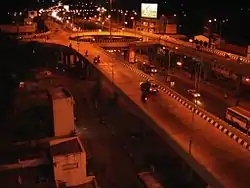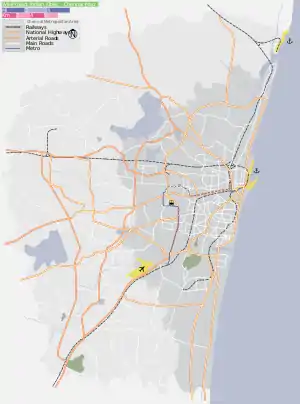Chromepet
Chromepet is a prime residential neighbourhood and a shopping district in Chennai, Tamil Nadu, India. It is located 22 km from the Chennai Central Railway Station. It lies on both sides of the Grand Southern Trunk (GST road), close to Thirumudivakkam and Tambaram, and next to Pallavaram. The 200-feet road connects Chromepet with Thoraipakkam. Chromepet is 6 km from Outer Ring Road, Thirumudivakkam, and 4 km south of the Chennai International Airport at Trisulam. It is the home to the famous Madras Institute of Technology, the institute where Dr. A. P. J. Abdul Kalam, former president of India, and (Technology cum Literature) Tamil writer Sujatha studied. The neighbourhood is served by the Chromepet railway station of the Chennai Suburban Railway Network and is a residential locality. Chromepet votes for the Sriperumbudur parliamentary constituency in the Indian national elections.
Chromepet | |
|---|---|
Neighbourhood | |
 MIT Flyover on GST road | |
 Chromepet | |
| Coordinates: 12.95161°N 80.14097°E | |
| Country | India |
| State | Tamil Nadu |
| Metro | Chennai |
| Languages | |
| • Official | Tamil |
| Time zone | UTC+5:30 (IST) |
| PIN | 600044 |
| Vehicle registration | TN-11(Chromepet),TN-85(Thirumudivakkam) |
| Planning agency | CMDA |
| Civic agency | Pallavaram Municipality |
| Website | www |
Etymology
Chromepet is actually not a Tamil name. Earlier, the town was the home of Chrome Leathers[1] and hence the name Chromepet—chrome (for the factory) and pettai (Tamil: பேட்டை in Tamil meaning suburb). The factory has been completely demolished and now, Balaji Hospital has been built in its place.
History
Together with Pallavaram, the Chromepet area was referred to as "Pallavapuram."[2] The area was part of Thondaimandalam ruled by Thondaimaans who were allied with the early Cholas from around the 1st to 2nd century CE. Later, the area was passed on to the chieftains of the Satavahanas. Chennai, Chengalpet, and the surrounding areas belonged to the Thondai Nadu during the Pallava period (3rd to 7th century CE). The historic period proper begins with the Pallava kings and the earliest of their stone inscriptions is found nearby in Pallavaram (Pallava Puram) in a cave temple excavated by Mahendravarman I (600–630 CE). Narasimhavarman I who succeeded Mahendravarman I waged battles against Pulekesin of the Chalukya dynasty and defeated him at Manimangalam, which is 11 km (6.8 mi) south-west of Chromepet.
Chola period
During the later Chola period (9th to 12th century CE) the area, which is now called Chromepet, belonged to the Churathur Nadu, named after Thiruchuram, the modern Trisulam village near Pallavaram. The Churathur Nadu extended from Tambaram in the south to Adambakkam and Alandur in the north and included Pammal, Pallavaram and Tiruneermalai.[3]
Pandya, Telugu Chola, Vijayanagar
Later the lands passed on to Pandya, Telugu Chola and the Vijayanagar dynasties between the 12th and 15th centuries.
British rule
During the British rule in the 18th century, the leather industries developed in the southwest part of the city. The Chrome Leather Company was established in this area in 1912 by European merchant Alexander Chambers. After his lifetime, the Chrome Leather Company was run by his wife Ida L. Chambers. She became the sole owner of the Chrome Leather Company and its properties in 1965 through an Order and Decree passed by the Honourable Court, Madras. She died in 1968.
Today the lands and properties of Chrome Leather Company belong to the late Ida L. Chambers, and most of the land to the west of the railway station is owned by CLC.
After independence, the Madras Institute of Technology (MIT) was founded in 1949 in an area extending over 20 hectares at Chromepet. Residential and commercial development started in the 1960s. Kulasekarapuram is the name of the area before MIT was established.
Post-Independence
Development of New Colony and the auction of residential lots in the early 1950s, by the Chrome Leather Company, led to rapid residential and commercial development of the Chromepet area.
Location in Context
Transportation links
Chromepet is connected to the city of Chennai by public transportation services including the electric train service that was built during British rule. Chromepet is located on the Beach – Tambaram – Chengalpattu suburban railway network. See Chennai suburban railway.
Chromepet is 3 km away from Chennai Airport. The Pallavaram – Perungudi bypass road connects Chromepet with Adambakkam, Nanganallur, Madipakkam, Medavakkam, Velacheri and Perungudi. Chitlapakkam main road connects Chromepet with Selaiyur and East Tambaram.
The Grand Southern Trunk Road (GST) that connects south Indian cities to Chennai passes through this township.
The MIT Flyover connects Grand Southern Trunk Road (GST) with Hasthinapuram and Chitlapakkam. The Flyover (near Ponds company) connects Tiruneermalai on the west and Thoraipakkam 100 feet outer ring road with the GST.
There is a bus stand in Hasthinapuram, a neighborhood on the eastern side of Chromepet Railway Station. Buses to Tambaram, Guduvanchery, T. Nagar, High Court, Chengalpet, Avadi, Pallavaram, Velachery, Vandalur, Pozhichalur, Broadway, etc. are available from Hasthinapuram.
Cultural Academy
The Chromepet cultural academy is famous in almost any part of the Chennai city. Occasionally there will be Carnatic Kacheries performed by great artists in cultural academy. The experts from other places in Chennai come to sing songs during the 'Margazhi utsav'.
Notes
- "Chrome Leathers". Archived from the original on 23 March 2017.
- Muthiah, S. (2014). Madras Rediscovered. Chennai: EastWest. p. 145. ISBN 978-93-84030-28-5.
- "Dr.Gift Siromoney's Home Page". cmi.ac.in. Archived from the original on 23 September 2015. Retrieved 3 May 2018.
- http://chennaisonline.com Archived 21 January 2016 at the Wayback Machine
- kumar, logesh. "Local NewsPapers Chennai - Neighbourhood Newspapers". shopschennai.com. Archived from the original on 25 August 2017. Retrieved 3 May 2018.
- "Local Newspapers - Neighbourhood Chennai". yptimes.com. Archived from the original on 18 April 2017. Retrieved 3 May 2018.
References
| Wikimedia Commons has media related to Chromepet. |